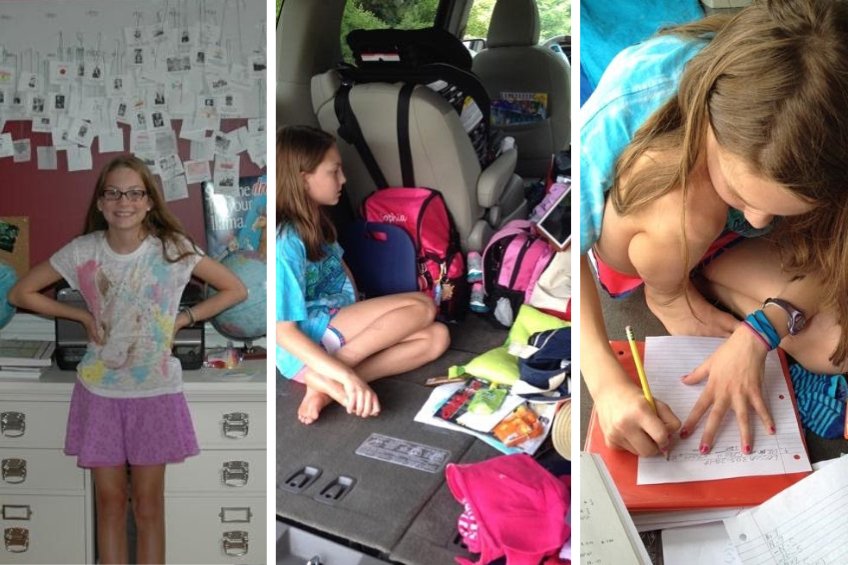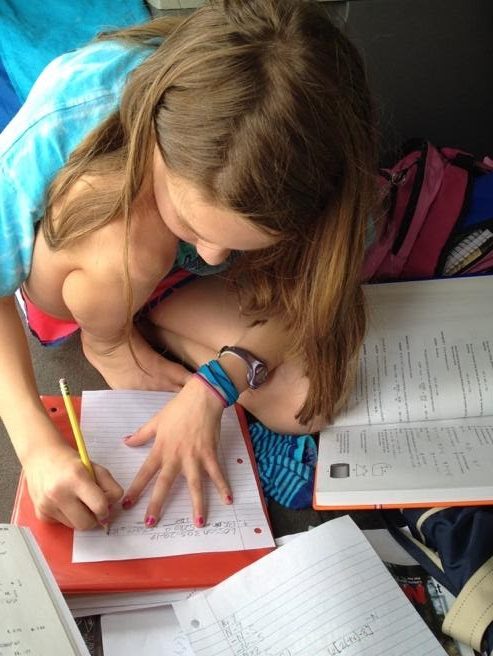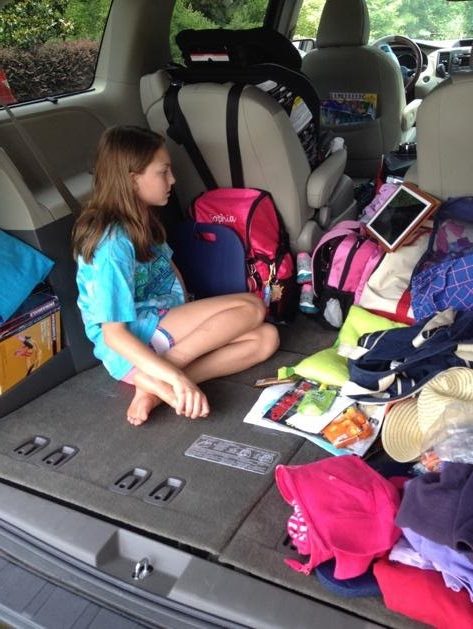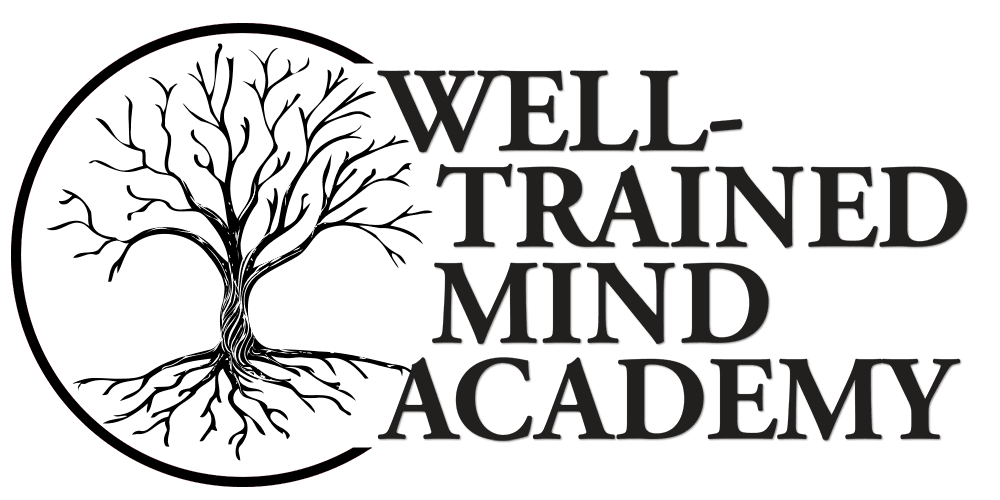Student Essay Showcase – “Homeschooling in America”

In this post we are featuring an essay written for Rhetoric Writing III by Emily R.
Her instructor, Jeff Jones, comments,
In her insightful essay, Emily confronts some of the stereotypes around homeschooling in a compellingly forthright way. Reflecting on personal experience, she pushes back against misconceptions. And, in considering evidence from studies, she deepens her understanding of herself as a homeschooled student. Ultimately she chooses to call herself an “online schooler,” and she writes, in one of my favorite passages, “The shared experience of learning at a self-determined pace without pressure from peers will be something that benefits me throughout my entire life.” In Homeschooling in America, Emily tells her story, and she tells it well.
We hope you enjoy, and learn something from, Emily’s essay!
Homeschooling in America
One of my earliest memories is of the sign on the bathroom doorknob at the kindergarten I attended for three weeks. I remember thinking it was the coolest thing—you could flip it to say “occupied” when you went into the bathroom and flip it to say “empty” when you were done. I also remember learning the letter “M” in class, but since I could already read, I finished the worksheet before the teacher was done giving the instructions. After that, it didn’t take long for my parents to bring me home and begin homeschooling. Since then, I haven’t spent a day in a brick-and-mortar school, and homeschooling has become part of who I am.
According to the U.S. Department of Education’s National Center for Education Statistics 2013 survey, just 3.4% of the American population is homeschooled (Smith, 2013). That means that 96% of people have their own idea of what we do, and often, it’s a misconception. We are assumed to be uber-religious people sheltered from all bad influences who struggle to interact socially. We are assumed to be either geniuses or idiots. Even, in extreme cases, we have been assumed to be abused by our parents. However, my experience with homeschooling has been much different than most, thanks to my parents’ choices to homeschool for educational, rather than religious reasons.
In order to better describe the homeschooling group and stereotypes surrounding it, this autoethnography will be broken into three parts, reflecting the different stages of education. These sections are meant to help educate readers by beginning with the simplest misconceptions about homeschoolers and finishing with more complex versions of our lives, similar to the way we begin with addition in elementary school and finish with calculus in high school. These sections also reflect how school is often forced into stages, rather than in one continuous narrative of learning and education.
The group of people in America that calls themselves “homeschoolers” is what Dr. Gordon Allport—a psychologist and professor at Harvard whose research on personalities formed the basis of personality psychology—would have referred to as an “in-group.” An in-group, according to Dr. Allport, is a group in which all the members use the word “we” with the same essential significance (Allport, 1954). For example, if my family were planning a trip to the beach, my sister and I could each say, “we are going to the beach,” and mean the same thing: my mom, my dad, my sister and I are going to the beach. In-groups can be as small as three or as big as 7 billion people: a family and all the people on Earth are both in-groups, because “we” has the same meaning to the people in these groups.
Sometimes the closeness of the members of an in-group can rely on the exclusion of others. This happens in large groups, like religions, as well as smaller friend-groups—in extreme cases, an in-group may be labeled a “clique” (Allport, 1954). Homeschoolers may feel closer to each other due to the fact that those who attend a brick-and-mortar school are not included in their in-group. This exclusion of people often causes images to be drawn by outsiders about those in the group. Often, these pictures are inaccurate and based solely on an interaction with a few people, rather than with a large percentage of the group.
Elementary School: Stereotypes
The most common stereotype of a homeschooling family is one that attends church multiple times per week, teaches a faith-based curriculum, and attends few social activities. They have many children and often wear old-fashioned, odd, or out of style clothing, like long denim skirts, coke-bottle glasses, and collared shirts. The children are—how to put it lightly—weird. They can’t carry on a conversation, have extremely few friends, and are blissfully unaware of the darker aspects of society. Finally, they do very little schoolwork compared to public schoolers: they sleep in, are done before lunch time, and above all, do school in their pajamas. After all, if your parents are teaching you, how smart could you really be?
Apparently, people think we are either complete idiots or geniuses. We don’t go to public school because we would be held back too many times, or we have already completed calculus in fourth grade. On multiple occasions, I have told people I’m homeschooled, and, because I seem to be able to carry on an intelligent conversation, they reply “Oh, you must be really smart, then.” The question that always comes next is “Do you have any friends?” This is often followed by “Do you do school in your pajamas?”
Contrary to popular belief, these assumptions only describe a small percentage of homeschoolers. I do, in fact, have friends outside of my family that I see on a regular basis. Through extracurricular activities like swim team, an art class, a volunteer organization, and a job, I have managed to make a few close friends as well as many other good acquaintances. I have even been told several times by public schoolers that I’m normal, and homeschooling hasn’t made me weird. What a relief.
These stereotypes fit only a few of the 1.7 million homeschoolers in America. The vast majority that I have encountered dress normally, speak normally, and have social activities other than church. Some of them attend classes at a co-op or local college in order to get a classroom experience. Many are on athletic teams or belong to other organizations like the Beta Club or 4-H. One defining trait, however, found in the vast majority of homeschoolers, is a religious curriculum. In 2007, parents were asked by the National Household Education Surveys Program (NHES) about the reasons they chose to homeschool their children, and eighty-three percent replied that they had “a desire to provide religious instruction” (Kunzman, 2010). Over one-third replied that this was their primary reason for homeschooling.
Middle School: Thinking Outside the Stereotypes
Robert Kunzman and Milton Gaither, professors at Indiana University and Messiah College, respectively, did a study on religious fundamentalism in homeschoolers. They discovered that though there has been a long-time presence of secular homeschoolers, the recent emergence and dominance of Christian homeschool advocacy groups has contributed to the religious stereotype. These groups, the most prominent being the Home School Legal Defense Association (HSLDA), are occasionally seen in the news when something controversial happens to a homeschooler. Its leader, Baptist minister and lawyer Michael Farris once said, “Homeschooling has given us a way to obey God’s command to teach our children to love God as we go through the day… the only way to make that practical, to implement the command about teaching kids to love God, in the way that he prescribed, that I’ve figured out, is homeschooling” (HSLDA, 2010).

Most homeschoolers are Christians. On top of that, researchers have approximated that anywhere from one to two-thirds of homeschoolers use a religious curriculum (Kunzman, 2010). However, even if two-thirds of all homeschoolers are homeschooling for religious reasons, that leaves at least half a million homeschoolers, myself included, who are secular (non-religious) homeschoolers.
I began homeschooling because my parents rejected the notion of forcing education into stages. They did not see the point of learning every subject at one standardized pace, when I could instead move at my own speed. Therefore, throughout my early years of school, I learned topics at my own rate, moving on when I was ready rather than when the teacher or class was ready. Instead of being taught to ask questions only when the teacher called on me, my curiosity was fostered; questions, and subsequently, learning, was encouraged. While my peers were sitting in classrooms, eagerly anticipating the bell, I could do my work anywhere, at any time. At the beginning of each school year, I would make a list of topics I wanted to learn about, and in addition to the required subjects—like math, science, and history—my parents would make an effort to teach me those things.

This flexibility can lead to the thought that homeschoolers do very little work. Because I only did work four days a week throughout elementary and middle school, and typically finished before 2PM, my friends thought I was “so lucky” and I “had it easy.” However, what many people don’t realize is that all the things accomplished in public elementary and middle schools can be accomplished in half the time. Despite spending drastically less time doing work, I finished middle school with more classes under my belt than my public-school peers.
This is where the genius homeschooler stereotype comes into play. Luckily, this is not a negative stereotype, and occasionally, it is nice to have people automatically assume I’m smart. However, this can sometimes get out of hand, with people crediting homeschooling for my intelligence, rather than my hard work. In July 2019, upon hearing of my 35 ACT score, a friend of mine (who attends public school) exclaimed “Wow! Is that because you’re homeschooled?” This remark hurt. It hurt because it discounted the effort that I have put in and judged me based on what I do, not who I am. I managed to reply, “No. It’s because I’m smart,” but I still think about the exchange to this day, wondering if I could have said something wittier, more scathing, more…anything.
I’m not a genius. But I am consistently at the top of my classes. I work hard, and the results show. When the results are then accredited to something other than my labor, I feel that I need to distance myself from that thing. In order to associate my accomplishments with myself, rather than with my in-group, I need to disassociate with homeschoolers.
But in doing so, don’t I distance myself from everything I have grown up around? Don’t I break ties with fellow homeschooling families and friends? Can I really leave the group, just like that?
Well, yes, and no.
Higher School: My Experiences

My parents chose to homeschool me not because of religious preferences, but because they thought I could learn more at home, with the choice to move at my own pace and learn about topics I was interested in. Consequently, I progressed rapidly through mathematics in the elementary stages, and now in high school, I have the choice to take several different upper-level courses. I never struggled in any subjects the way my peers did, because I was given the opportunity to spend more time on trickier topics until I had fully mastered them.
Throughout middle school, I never had any interest in attending public school—and for good reason. I spent less time doing work than my peers, which allowed me to do dozens of activities. From gymnastics to soccer to science classes to figure-skating, I tried just about every extra-curricular activity, none of which would have been possible without homeschooling. However, my parents have always made it clear that it is my choice to stay home or attend a brick-and-mortar school. Until high school, I didn’t give this any serious consideration.
Back at the start of ninth grade, I considered going to my local public high school in order to get more social interaction. Though I’m not socially awkward and I have friends, I have missed the experience of having a big group of people I see on a regular basis. However, I ended up deciding to join a larger swim team and stay home; I’ve never doubted that I get a higher quality education at home than I would in a public school.
In high school, I began taking online classes with the Well-Trained Mind Academy (WTMA). WTMA caters specifically to my type of homeschooling: high level, secular, and challenging. It teaches students how to manage their time and work independently, and how to communicate with peers as well as teachers. It has helped me to make friends across the nation who are more similar to me than those in my own city, and it has given me a group of people that I can talk to on a regular basis. Since starting classes online, I have made a conscious effort—when asked where I attend school—to say, “I go to an online school” rather than “I’m homeschooled.”
I don’t want to forget about my homeschooling community—I’ve been a part of it so long and it has come to define who I am—but by choosing to associate myself with online school instead, I avoid most of the stereotypes of anti-social, religious, and sheltered. Online school is such a new development that people have not yet had time to develop stereotypes and judgements about it. As such, I set the stereotypes, and I choose how people view what I do. If I want online schoolers to be known as social and smart, I can introduce myself to a new person and act friendly and intelligent. The same goes for if I want us to be known as shy and stupid.
By joining the online school community, I have simultaneously left and remained a part of the homeschooling in-group. While I still do school from home—though more often than not I tend to be at the library or a coffee shop—I don’t learn in the stereotypically homeschool way. I don’t have a religious curriculum, and I don’t stay in my pajamas all day. I do have friends and social interactions like public schoolers. I’ve even attended school dances with a group of friends.
The beauty of being a homeschooled online schooler is that I belong to two very small groups of people. Throughout my adult life, if I meet someone who was homeschooled, I will immediately be able to identify with them more than someone in a public school would with another public schooler. The shared experience of learning at a self-determined pace, without pressure from peers will be something that benefits me throughout my entire life.
My schooling experience has been vastly different than that of the general public, and even from typical homeschoolers. I’m thankful for that. I was allowed to choose my education, which resulted in an experience unlike any other. Though people have judged my community, I have found a way to be a part of it and avoid the stereotypes. I am a homeschooler, but more specifically, I am an online schooler. As these communities continue to grow and the general public becomes more aware of them, I can hope that the stereotypes will change for the better. Until then, homeschoolers will be at their desks, their kitchen tables, and the trunks of their cars, working hard, and becoming smarter.
